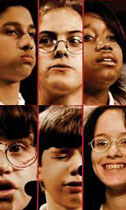
Movie Guru Rating:

Comment
on this review
| |

A heartfelt look at competitors who can spell, or fail
by Adrienne Martini
People are just neat. Sure, there are individuals who can be a bit hard to take and/or actively irritating, but taken as a whole, humans are interesting. Just look at things like democracy. Or baseball card collections. Or Chinese lacquered-boxes. None of the millions of fascinating things that people can get up to are strictly necessary for survival. But, without them, life wouldn't be nearly as enjoyable.
Sociologists, of course, have known this for decades. So have writers. And, more recently, so have TV producers and documentary filmmakers. While the relative worth of the recent glut of reality TV has yet to be debated, there's no denying that there is just something curiously watchable about other people's lives. But what separates the TV fodder from a well-crafted film is the latter's ability to put it all in perspective, to do more than simply celebrate people in all their glorious strangeness and to try to figure out how it fits into some larger meanings of life, if there are any.
Pretensions and explanations of the human condition, the best docs are also just blazingly entertaining. Like Spellbound, Jeff Blitz's 90-minute doc that follows eight kids as they compete for the crown at the 1999 National Spelling Bee. At first glance, a movie about kids spelling doesn't sound like a gripping tale. But it is, full of more heart and passion and flat-out human strangeness than most of what you'll see this summer.
Each of these eight kids—eighth grade is the cut-off point—has his or her unique reason for wanting to win the Bee and each speaks to some part of the American mythos. Like Angela Arenivar, a first generation Texan whose father snuck across the Mexican border 20 years ago to give his family a chance at a better life. Or Ashley White, an African-American girl whose brain may win her a ticket out of inner-city D.C. Or Neil Kadakia, a 12-year old pushed through the Bee by his father's desire to win. Or Emily Stagg, a second-year Bee contestant who lives a fairly privileged life and isn't sure why winning is so important to her.
The first half of the film revolves around these spellers and the dynamics of their families, as well as a glimpse into the hours of prep work competing in the Bee requires. Again, it doesn't sound interesting, but it is. Part of what makes Spellbound so charming and smart is the access that Blitz has been given. In turn, he doesn't abuse this intimacy and turn this project into an exercise in mocking and arch irony. Some of the kids and their folk would become sport for other filmmakers—like April DeGideo's parents who are perfectly content to live an unexamined life with a hyperactive Jack Russell terrier, or geeky Harry Altman, who you just know is going to spend the rest of his adolescence getting wedgies from jocks. Blitz doesn't judge—and the result is candid and heartfelt without being sentimental.
The second reel of Spellbound unspools more like a traditional narrative. There is an overt structure—the competition itself—and the harsh realities that the Bee imposes. Misspell one word and you're gone. No second chances, unless you can requalify the next year. There are no judgment calls in the black and white world of professional spelling.
Where there are shades of gray, which is in how the kids and their families respond to the pressure, is where the film comes alive. Some thrive, some act with remarkable grace. There are tears. And there is relief. What Spellbound captures is all of the stuff that doesn't make it onto ESPN's annual airing of the finals. Yes, we find out who won and how, but we also get a small glimpse into the whys.
Still, what drives the film is not its deeper messages but the people within it. It's just such a strange thing to pursue, this ability to spell competitively, and the near-mythic rewards these spellers attribute to winning is interesting in its own right. Like growing a prize-winning cabbage or setting a world record for the world's longest fingernails, it's something that only people could dream up. Ain't it cool?

July 10, 2003 * Vol. 13, No. 28
© 2000 Metro Pulse
|